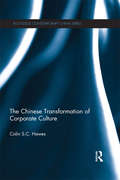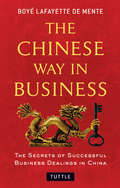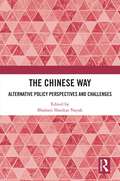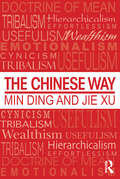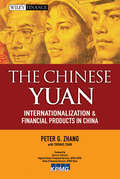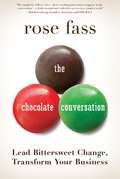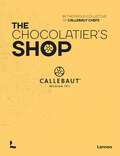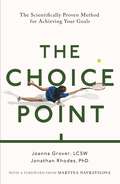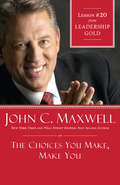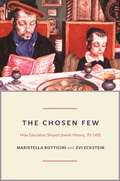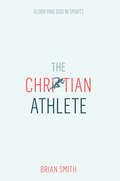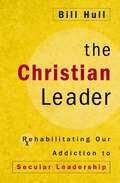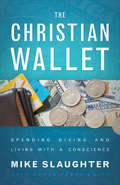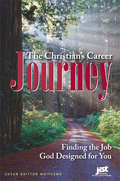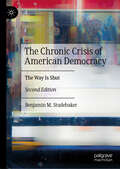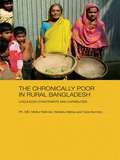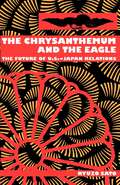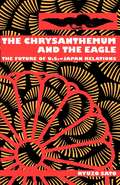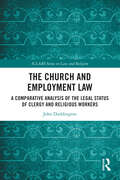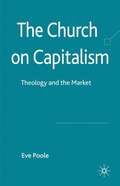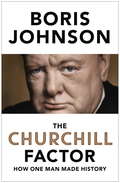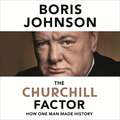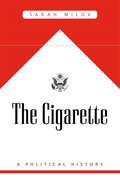- Table View
- List View
The Chinese Transformation of Corporate Culture (Routledge Contemporary China Series)
by Colin HawesIn recent years, Chinese policymakers and corporate leaders have focused significant attention on the concept of corporate culture. This book will reveal the political, social and economic factors behind the enormous current interest in corporate culture in China and provide a wide range of case studies that focus on how large corporations like Haier, Huawei and Mengniu have attempted to transform their cultures, and how they represent themselves as complying with the Chinese government’s interpretation of "positive" corporate culture. Hawes demonstrates how the foreign concept of corporate culture has been re-defined in China to fit the Chinese political, social and cultural context. He examines how this re-definition of corporate culture reflects a uniquely Chinese conception of the purposes and social functions of the capitalist business corporation and how the Chinese Communist Party’s active promotion of "socialist" corporate culture evidences a shift in the Party’s identity towards a business-friendly champion of corporate and economic development. This work will be of great interest to students and scholars of Asian Studies, Business and Management and Chinese studies.
The Chinese Way in Business
by Boyé Lafayette De MenteThis book is a comprehensive, expert guide to doing business in China.Western technology, management expertise and capital have fueled an incredible expansion of China's economy. Trade with China is at an all time high and so are the numbers of Westerners travelling to China for business. Business from China has also picked up as Chinese firms look to expand abroad. Understanding the ins and outs of the confusing and often contradictory Chinese business culture can lend an enormous advantage. The Chinese Way in Business is an invaluable tool that teaches Westerners the basic Chinese philosophy of doing business and how to cultivate strong personal relationships with Chinese business people and Chinese nationals.The author, Boye Lafayette De Mente worked in Asia for over thirty years as a journalist and business consultant and has long been considered an authority on East Asian business. In this book, he reveals the historical factors, collective traits and individual qualities that determine how the Chinese do business today, and the direction their economy will take in the future. His is a true insider's view-whether the topic is the legal framework for business development, or the importance of social relationships to successful business dealings in China.
The Chinese Way in Business
by Boyé Lafayette De MenteThis book is a comprehensive, expert guide to doing business in China.Western technology, management expertise and capital have fueled an incredible expansion of China's economy. Trade with China is at an all time high and so are the numbers of Westerners travelling to China for business. Business from China has also picked up as Chinese firms look to expand abroad. Understanding the ins and outs of the confusing and often contradictory Chinese business culture can lend an enormous advantage. The Chinese Way in Business is an invaluable tool that teaches Westerners the basic Chinese philosophy of doing business and how to cultivate strong personal relationships with Chinese business people and Chinese nationals.The author, Boye Lafayette De Mente worked in Asia for over thirty years as a journalist and business consultant and has long been considered an authority on East Asian business. In this book, he reveals the historical factors, collective traits and individual qualities that determine how the Chinese do business today, and the direction their economy will take in the future. His is a true insider's view-whether the topic is the legal framework for business development, or the importance of social relationships to successful business dealings in China.
The Chinese Way: Alternative Policy Perspectives and Challenges
by Bhabani Shankar NayakThis volume seeks to develop new narratives on China's alternative policy and challenges policy makers on gender, regional, income and wage inequalities among rural migrant workers in China. The book also looks at China's social, environmental, economic and governance policies aimed at implementing a sustainable financial and corporate system for a prosperous society. The argument that China follows 'capitalism or socialism with Chinese characteristics' emanates from the Eurocentric ideological narratives based on 'varieties of capitalism' and 'national socialism'. This book attempts to move away from the duality of ideological criticism and dichotomous defence of China based on the ideological prisms of capitalism or socialism. It rejects the flawed analysis of both sides of the ideological divide. For all its limitations within the world capitalist system, China's achievements can't be undermined. The attempt to undermine Chinese achievements is a process and a strategy to delegitimise the Chinese state, the Communist Party of China, the Chinese success story, and to hide the available alternatives from the experience of The Chinese Way. The book will be a great read to students, researchers and scholars of Chinese studies, political economy, development studies and those interested in China's economic and public policies in general.
The Chinese Way: Walked Out Of The New Way Of Cancer Treatment With Immune Regulation And Control Of Combination Of Chinese And Western Medicine
by Min Ding Jie XuAs business becomes increasingly globalized and China establishes its growing role in the international business environment, developing an understanding of the complex culture is important to anyone acting in the global arena. This book offers readers a thorough and nuanced resource to that end, describing the ever-evolving Chinese way of life circa 2014, based on extensive primary and secondary data. Taking an anthropological approach to achieve a well-rounded representation, the book covers 51 topics that would have been studied if China were a newly discovered civilization. It explores the culture through its examination of the nine core concepts that best represent the Chinese way of life. While the book is a rigorous treatment of the Chinese way of life, it is also filled with personal stories and perspectives from close to 1000 successful Chinese from academia, business, and government. The Chinese Way equips international business students, scholars, and practitioners with a deep understanding of a society that is a major player in global business today and offers a foundation for successful business interactions with Chinese companies, organizations, and people.
The Chinese Yuan
by Peter G. Zhang Thomas ChanFew topics have attracted as much attention worldwide in recent years as the RMB. These debates have gained added urgency in light of the financial crisis and the topic of RMB revaluation is now being actively debated in countries all over the world from Tunisia to the United States. This book explores the ever-changing role of the RMB and the related derivative products. However, it does so from a view that is heavily influenced by the fallout from the financial crisis as well as the in the context of the increasing maturity of the Chinese capital markets. The author has drawn on his experience as a regulator to provide invaluable views, insights and information on RMB derivative products and the development of this market going forward. Key topics include: Overview of current China economy and its capital market In-depth analysis on the China's banking system and foreign exchange system Extensive analysis of on-shore and off-shore financial products in China Explanation of the needs and reasons for RMB products innovation Insights into the internationalization of the RMB Not only will this book leave its readers with a much clearer idea of the structure of China's capital markets but it also gives insights on the market going forward leveraged through Peter Zhang's many years of experience as both a senior banker and through his integral role in the key regulatory authority of the banking sector, the CBRC.
The Chocolate Conversation: Lead Bittersweet Change, Transform Your Business
by Rose FassThe single factor that determines success or failure in big business today is conversation. Great leaders use public and private conversation to send a clear message, cultivate a common worldview, set high standards and reachable goals, and uncover concerns that can undermine an organization. So what conversation are you, as a leader, having with your team? Experienced change consultant Rose Fass explains how too often we think we're having the same conversation--about "dark chocolate," for instance--only to be referring to three different things: milk, white, or bittersweet varieties. She shows us how to first establish common ground that leads to an effective discourse for addressing relevance, growth, and scaling: the three most important issues she sees in business today. In a light-hearted and humorous way, Fass shows how leaders can avoid a meltdown and instead drive transformation through the way they communicate in a language that all stakeholders can understand.
The Chocolatier's Shop (Callebaut Chefs)
by The proud collective of Callebaut ChefsThe Chocolatier&’s Shop is the professional bible for the true professional. In this book you will find answers to all questions to start or grow your chocolate shop.If you are a true chocolate professional, then The Chocolatier&’s Shop is your professional bible. In this book you will find answers to all questions to start or grow your chocolate shop: How do I build or further expand my brand? Which products do I include in my range? How do I deal with staff and customers? Which tools do I absolutely need? How do I manage my stock?
The Choice Point: The Scientifically Proven Method for Achieving Your Goals
by Jonathan Rhodes Joanna GroverThe scientifically proven method to overcome obstacles and make choices that lead us closer to our goalsWITH A FOREWORD BY MARTINA NAVRATILOVAWhen we choose to go to the gym at 6 a.m., keep running that marathon or stay up late to study, we are making conscious, value-based decisions that help us fulfil our goals. But even though we know that daily good choices add up to healthy habits and strong results, these days it's just too easy to surrender to negative thoughts and old habits. How can we not?Enter Functional Imagery Training (FIT). Grounded in science, FIT helps us lengthen our Choice Point: that moment when we say to ourselves, 'Am I going to make the healthy decision, or am I going to choose to take an action that I know will undermine my success?' Merging mindfulness, motivational interviewing and cognitive behavioural therapy into a user-friendly model, The Choice Point grants us control of the decisions that define us.
The Choice to Cofound and Initial Control and Ownership Splits in Startups
by Stig LeschlyIndustry and Background Note
The Choices You Make, Make You
by John MaxwellSmart leaders learn from their own mistakes. Smarter ones learn from others' mistakes--and successes. John C. Maxwell wants to help you become the smartest leader you can be by sharing Chapter 20, The Choices You Make, Make You of Leadership Gold with you. After nearly forty years of leading, Maxwell has mined the gold so you don't have to. Each chapter contains detailed application exercises and a "Mentoring Moment" for leaders who desire to mentor others using the book. Gaining leadership insight is a lot like mining for gold. You don't set out to look for the dirt. You look for the nuggets. You'll find them here.
The Chosen Few: How Education Shaped Jewish History, 70-1492 (The Princeton Economic History of the Western World #42)
by Maristella Botticini Zvi EcksteinHow the Jewish people went from farmers to merchantsIn 70 CE, the Jews were an agrarian and illiterate people living mostly in the Land of Israel and Mesopotamia. By 1492 the Jewish people had become a small group of literate urbanites specializing in crafts, trade, moneylending, and medicine in hundreds of places across the Old World, from Seville to Mangalore. What caused this radical change? The Chosen Few presents a new answer to this question by applying the lens of economic analysis to the key facts of fifteen formative centuries of Jewish history. Maristella Botticini and Zvi Eckstein offer a powerful new explanation of one of the most significant transformations in Jewish history while also providing fresh insights into the growing debate about the social and economic impact of religion.
The Christian Athlete: Glorifying God in Sports
by Brian SmithThe Christian Athlete is a gospel-centered guide that assists athletes who identify as Christians and are seeking to understand how to practically apply their faith to their sport. Athletes desire—and deserve—a more substantive expression of the Christian faith in the context of sport, but they don&’t know what it looks like or where to turn to learn more. Author Brian Smith shares his story as an athlete and coach, and his experience working with high-level athletes in the last decade to help readers better understand how to integrate faith and sport by: Assisting those who want a wide-angled understanding of how to live the Christian faith in the context of sportsWalking through the many questions Christian athletes ask about winning, losing, injuries, practice, and everything in betweenMoving Christian athletes from simply having clichéd spiritual sayings decorating their bodies or t-shirts to actually living out their faith through all the opportunities their sport offers themThe Christian Athlete will show readers how to live out a biblical perspective on athletics and urge them to engage in the gifts they are given to glorify God whether they are the team MVP or riding the bench.
The Christian Leader: Rehabilitating Our Addiction to Secular Leadership
by Bill Hull Robby Gallaty<P>From the author of the best-selling book The Disciple-Making Pastor comes a call to Christian leaders to let go of their addiction to secular models of leadership rooted in pragmatic success.<P> Most leadership literature talks about having the “right kind” of leadership personality.<P> You know the type: big-picture visionaries who serve others and get the best out of people.<P> But the popular pattern of doing what works and getting rewarded for it is actually the enemy of Christian leadership. <P>It thrives on making our work impersonal and exploitive.<P> Far too often, it serves the leader rather than those the leader leads.<P> Sadly, this pattern dominates Christian leadership in the West.<P> We need a different style of leadership — one patterned after Jesus. Jesus influenced others because of who he was, not because he was well-known or a person of power or because he had mastered a set of skills or implemented an effective leadership strategy.<P> He could have completed his mission living in your house, driving your car, married to your spouse, working at your office, and raising your kids because leadership comes down to character.<P> Many who aspire to leadership are looking for the right circumstances so they can lead. <P>Many in positions of leadership find it difficult to lead because of obstacles, such as a lack of funds, authority, and or confusion about methods. Jesus faced all of these — and more — yet he accomplished his mission.<P> This is not a book about improving Christian organizations; it is about changing how Christians lead.<P> It is for anyone with a megaphone, a platform to speak, who wants to lead others in being a witness for truth. It is for people with a pulpit, whether that pulpit be a business or a position of influence in a domain of the culture: entertainment, sports, politics, industry, the arts, academia, or religion.<P> If you are someone to whom others listen— this book is for you.<P> Each chapter begins with a title and statement about Jesus’ life. <P>Jesus was a different kind of teacher.<P> The Pharisees focused on doing the right thing. Jesus emphasized becoming the kind of person who wants to do the right thing. <P>Others taught the importance of doing good; Jesus taught how to be good. <P>He didn’t teach behavior modification alone; he taught how to change the sources of behavior.<P> Knowing how to lead others begins by seeing Jesus as your leader.
The Christian Wallet: Spending, Giving, And Living With A Conscience
by Mike SlaughterEvery Christian knows that we are called to love God with all our heart, mind, soul, and strength. But what about our wallet? We are asked to open it every Sunday when the offering basket comes by and are told that giving is a way of being a "good steward," but what about spending money at a restaurant or grocery store? Best-selling author Mike Slaughter offers a comprehensive look at how Christians use their money in The Christian Wallet. Slaughter explores today's culture of consumerism and the impact of what we buy, asking difficult questions about morality and money.The Christian Wallet helps Christians grapple with important questions about stewardship: how we spend, how we live, how we save, how we give, and what it all means. Questions for individual or group study are also included with each chapter.
The Christian's Career Journey
by Susan Britton WhitcombWhether you want to work in the private sector or public sector, business or industry, corporate America or mom-and-pop shop, nonprofit or ministry organization, this book will unveil the deeper significance and purpose God has for your career.
The Chronic Crisis of American Democracy: The Way Is Shut
by Benjamin M. StudebakerThis book argues that American democracy is in crisis. The economic system is slowly subjecting Americans of nearly all income levels and backgrounds to enormous amounts of stress. The United States lacks the state capacity required to alleviate this stress, and politicians increasingly find that if they promise to solve economic problems, they are likely to disappoint voters. Instead, they encourage voters to blame each other. The crisis cannot be solved, the economy cannot be set right, and democracy cannot be saved. But American democracy cannot be killed, either. Americans can’t imagine any compelling alternative political systems. And so, American democracy continues on, in a deeply unsatisfying way. Americans invent ever-more elaborate coping mechanisms in a desperate bid to go on. But it becomes increasingly clear that the way is shut. The American political system was made by those who are dead, and the dead keep it. This new edition includes audiobook files at the chapter level.
The Chronically Poor in Rural Bangladesh: Livelihood Constraints and Capabilities (Routledge Studies in Development Economics)
by Noriatsu Matsui Yukio Ikemoto Pk. Md. RahmanThis book examines rural poverty in Bangladesh. Based on detailed empirical research and surveys of households in Bangladesh, it provides an accurate portrait of the everyday situations faced by the rural poor in Bangladesh today, covering all aspects of household behaviour. All of the key issues are explored, including health, nutrition, housing conditions, human capital, household asset and liabilities, gender issues, livelihood strategies, distribution of household income and expenditure, social capital, intergenerational mobility of the chronically poor, women’s mobility, shocks and coping strategies, and vulnerability to poverty. The book focuses in particular on the poorest of the poor households, the chronically poor, seen by many in the development community to be the core of the problem of poverty. It shows that the basic characteristics of the chronically poor households in rural Bangladesh are: more heavily female-headed households, higher dependency ratio of children in demographic composition, and dominated by lower levels of assets, shorter years of schooling and limited employment opportunity. Throughout, it draws precise conclusions on the basis of quantitative data, which makes this book an important resource for policy-makers and development practitioners, as well as students and researchers.
The Chrysanthemum and the Eagle: The Future of U.S.-Japan Relations
by Ryuzo SatoWhether in the form of the ongoing automotive wars, books and films such as Michael Crichton's Rising Sun, or George Bush's ill-fated trip to Japan in 1991, frictions between the United States and Japan have been steadily on the rise. Americans are bombarded with images of Japan's fundamental difference; at the same time, voices in Japan call for a Japan That Can Say No. If the guiding principle of the Clinton administration is indeed new values for a new generation, how will this be reflected in U.S.-Japanese relations?Convinced that no true solution to U.S.-Japanese frictions can be achieved without tracing these frictions back to their origin, Ryuzo Sato here draws on a binational experience that spans three decades in both the Japanese and American business and academic communities to do just that. In an attempt to bridge the communication gap between the two countries and dispel some of the mutual ignorance and misunderstanding that prevails between the two, Sato addresses the following questions: --Is Japan really different? --Has America's sun set?--How have conflicting views on the role of government affected U.S.-Japan relations?--What are the real differences in American and Japanese industrial policies?--What is the anatomy of U.S.-Japanese antagonisms?--What effect has the collapse of the bubble economy had on relations?--What is Japan's future course? Is it truly a technological superpower? Can it avoid international isolation? An incisive personal look at one of the most important political and economic global relationships, written by a major player in the world of international business and finance, THE CHRYSANTHEMUM AND THE EAGLE provides a readable and engaging tour of U.S.-Japan relations, past and present.
The Chrysanthemum and the Eagle: The Future of U.S.-Japan Relations (Open Access Lib And Hc Ser.)
by Ryuzo SatoWhether in the form of the ongoing automotive wars, books and films such as Michael Crichton's Rising Sun, or George Bush's ill-fated trip to Japan in 1991, frictions between the United States and Japan have been steadily on the rise. Americans are bombarded with images of Japan's fundamental difference; at the same time, voices in Japan call for a Japan That Can Say No. If the guiding principle of the Clinton administration is indeed new values for a new generation, how will this be reflected in U.S.-Japanese relations?Convinced that no true solution to U.S.-Japanese frictions can be achieved without tracing these frictions back to their origin, Ryuzo Sato here draws on a binational experience that spans three decades in both the Japanese and American business and academic communities to do just that. In an attempt to bridge the communication gap between the two countries and dispel some of the mutual ignorance and misunderstanding that prevails between the two, Sato addresses the following questions: --Is Japan really different? --Has America's sun set?--How have conflicting views on the role of government affected U.S.-Japan relations?--What are the real differences in American and Japanese industrial policies?--What is the anatomy of U.S.-Japanese antagonisms?--What effect has the collapse of the bubble economy had on relations?--What is Japan's future course? Is it truly a technological superpower? Can it avoid international isolation? An incisive personal look at one of the most important political and economic global relationships, written by a major player in the world of international business and finance, THE CHRYSANTHEMUM AND THE EAGLE provides a readable and engaging tour of U.S.-Japan relations, past and present.
The Church and Employment Law: A Comparative Analysis of The Legal Status of Clergy and Religious Workers (ICLARS Series on Law and Religion)
by John DuddingtonThis book examines the current law on the employment status of ministers of religion together with religious workers and volunteers and suggests reforms in this area of the law to meet the need for ministers to be given a degree of employment protection. It also considers the constant theme in Christian history that the clergy should not be subject to the ordinary courts and asks whether this is justified with the growth of areas such as employment law. The work questions whether it is possible to arrive at a satisfactory definition of who is a minister of religion and, along with this, who would be the employer of the minister if there was a contract of employment. Taking a comparative perspective, it evaluates the case law on the employment status of Christian and non-Christian clergy and assesses whether this shows any coherent theme or line of development. The work also considers the issue of ministerial employment status against the background of the autonomy of churches and other religious bodies from the State, together with their ecclesiology. The book will be of interest to academics and researchers working in the areas of law and religion, employment law and religious studies, together with both legal practitioners and human resources practitioners in these areas.
The Church on Capitalism
by Eve PooleAn examination of the views on capitalism of bishops, academics and business people in the Church of England. Highlighting the richness and distinctiveness of these arguments, it also points to flaws and gaps. Offering a new framework for public theology, Poole urges the Church to take its proper place in re-shaping the global economy.
The Churchill Factor: How One Man Made History
by Boris JohnsonAs the country navigates a national crisis once again, read how Britain's Prime Minister was inspired by Winston Churchill.One man can make all the difference.Now leader of the UK himself, Boris Johnson explores what makes up the 'Churchill Factor' - the singular brilliance of one of the most important leaders of the twentieth century. Taking on the myths and misconceptions along with the outsized reality, he portrays - with characteristic wit and passion - a man of multiple contradictions, contagious bravery, breath-taking eloquence, matchless strategizing and deep humanity.Fearless on the battlefield, Churchill had to be ordered by the King to stay out of action on D-Day; he embraced large-scale strategic bombing, yet hated the destruction of war and scorned politicians who had not experienced its horrors. He was a celebrated journalist, a great orator and won the Nobel Prize for Literature. He was famous for his ability to combine wining and dining with many late nights of crucial wartime decision-making. His open-mindedness made him a pioneer in healthcare, education and social welfare, though he remained incorrigibly politically incorrect. As Prime Minister Boris Johnson says, 'Churchill is the resounding human rebuttal to all who think history is the story of vast and impersonal economic forces'. Published in association with Churchill Heritage, The Churchill Factor is essential reading for anyone who wants to know what makes a great leader in a time of crisis.
The Churchill Factor: How One Man Made History
by Boris JohnsonAs the country navigates a national crisis once again, hear how Britain's Prime Minister was inspired by Winston Churchill. One man can make all the difference.Now leader of the UK himself, Boris Johnson explores what makes up the 'Churchill Factor' - the singular brilliance of one of the most important leaders of the twentieth century. Taking on the myths and misconceptions along with the outsized reality, he portrays - with characteristic wit and passion - a man of multiple contradictions, contagious bravery, breath-taking eloquence, matchless strategizing and deep humanity.Fearless on the battlefield, Churchill had to be ordered by the King to stay out of action on D-Day; he embraced large-scale strategic bombing, yet hated the destruction of war and scorned politicians who had not experienced its horrors. He was a celebrated journalist, a great orator and won the Nobel Prize for Literature. He was famous for his ability to combine wining and dining with many late nights of crucial wartime decision-making. His open-mindedness made him a pioneer in healthcare, education and social welfare, though he remained incorrigibly politically incorrect. As Prime Minister Boris Johnson says, 'Churchill is the resounding human rebuttal to all who think history is the story of vast and impersonal economic forces'. Written by Prime Minister Boris Johnson in 2014 and published in association with Churchill Heritage, The Churchill Factor is essential listening for anyone who wants to know what makes a great leader in a time of crisis.(P)2014 Hodder & Stoughton Limited
The Cigarette: A Political History
by Sarah MilovThe story of tobacco’s fortunes seems simple: science triumphed over addiction and profit. Yet the reality is more complicated—and more political. Historically it was not just bad habits but also the state that lifted the tobacco industry. What brought about change was not medical advice but organized pressure: a movement for nonsmoker’s rights.
